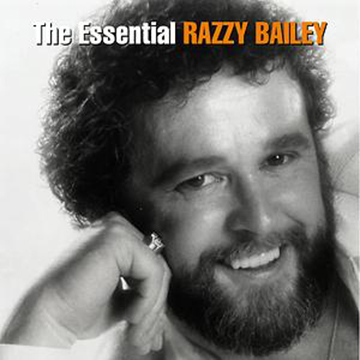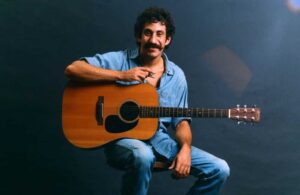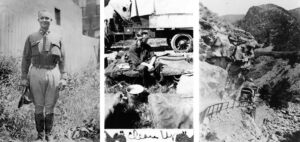I recently discovered a satellite radio station, and it brought back a lot of memories. It’s not just the songs the station plays (it specializes in moderate country hits that haven’t received commercial radio airplay in decades). It also reminds me of personal experiences when country music was becoming an obsession for me. The late 1970s and early ’80s turned me into the narrow-minded fellow I am today. It’s when I gave up all other forms of music for country. Many of those songs eventually became “classic country.” I don’t expect I’ll ever turn back.
Where I grew up, country artists didn’t appear at the local fair — or much of anywhere, for that matter. The largest arena in the area, seating all of 6,000, might book one, sometimes two country acts a year.
In 1980, Charley Pride traveled to the area for a show, and as usual, I bought some of the first tickets sold. It wasn’t just Pride who intrigued me, however. Razzy Bailey, although over 40 years old, served as the opening act. Bailey had just started stringing a few hits together, and I liked his sound. A few months after the concert, he made music history before coming out with a trucking song that turned into a No. 1 hit.
But Razzy Bailey’s story began long before he arrived on stage that evening in 1980.
Rasie Michael Bailey, who later adopted the name “Razzy,” sprang from country in the truest sense of the word. Born in Five Points, Alabama, a town with a population of less than 800 at upon his arrival in 1939, Bailey was raised on a farm in nearby LaFayette. The town where he grew up was just as country as his birthplace, although the population was twice as large.
But in true-life country fashion, Bailey got his start in music as a member of the LaFayette High School’s Future Farmers of America string band. In short order, he could be found on stages in nearby venues, where he gained regional popularity.
In 1966, Razzy Bailey wrote and recorded his first song, a single titled “9,999,999 Tears.” The tune received little attention at the time, but when Dickey Lee recorded it a decade later, Bailey’s songwriting gave him a name in Nashville.
The single rose to No. 3 on the country charts and crossed over as a pop hit. Lee charted another Bailey-written song a year later with “Peanut Butter.” By this time, RCA Records recognized Bailey’s talent and hired him as a songwriter — and soon gave him a shot as a performer with a recording contract. Bailey’s first album, “If Love Had a Face,” hit No. 33 on the charts and produced four Top 10 singles. Still, country fans didn’t widely recognize Bailey’s work.
All that changed in 1980 with the release of his self-titled album, “Razzy.”
“Razzy” produced three Top 10 hits, including two No. 1s — “Loving Up a Storm” and “True Life Country Music.” The pair of songs marked a rare feat in country music; they formed Side A and B of the same 45 rpm single. “True Life Country Music,” might be considered Bailey’s response to David Allan Coe’s hit, “You Never Even Called Me by My Name.” Bailey packed as much country music history into a two-and-a-half-minute record than anyone ever had.
In early 1981, Razzy Bailey released his third album, “Makin’ Friends.” It was even more popular than “Razzy” and included another three Top 10 hits, including two more No. 1s. In fact, the two No. 1 songs on the album again achieved double-sided hit status. “Friends” and “Anywhere There’s Jukebox” marked Bailey’s third and fourth No. 1 hits in a row, and the four occupied just two 45 rpms.
Consecutive double-sided No. 1s had never been produced in Nashville before Bailey arrived. Very quietly, Bailey went on to a career in which he recorded 15 Top 10 hits, seven of them rising to No. 1. And it was all achieved over a four-year period after Bailey released his first album.
In 1981, Bailey’s song “Midnight Hauler” marked his sixth consecutive No. 1 hit. The tune’s Side B companion failed to reach No. 1 however, topping out at No. 8 on the charts. The double-sided Top 10 hits meant Bailey barely missed a third consecutive history-making effort, one that would have been astonishing. Still, when it comes to staying power, “Midnight Hauler” is arguably Bailey’s most memorable song. Like “True Life Country Music,” which is packed with “country gold” song references, “Midnight Hauler” included most everything its writers knew about trucking.
In “Midnight Hauler,” Bailey is both the singer of and subject of the song — that is, assuming his reference to “old R.B.” is self-directed. “R.B.” is making a nighttime crossing of the desert Southwest with a heavy, strapped-down load in an 18-wheeler. In a time before ELDs, the driver mentions that he’s been driving all day but has no intention of bedding down for the night. After all, he “just pulled out of Santa Fe,” and if he’s going to make it to his hometown of Kansas City by “the break of day,” there’s little time to waste.
Like many good trucking songs, there’s a woman waiting for the driver in Kansas City, and he’s ready for the trip in his Peterbilt. Like Dave Dudley in “Six Days on the Road,” R.B. has two full fuel tanks and a “belly full of coffee and whites.” He’s using his C.B. to keep track of law enforcement and notes that he’s “cannonballing her home.” It’s a good night to make time, he claims. It’s a Saturday night, and he’s the only one on the highway, after all. That makes his Peterbilt a streak across the desert.
The song doesn’t really come to an end, unless you count a rockabilly closing instrumental segment. But lyric-wise, the story, we can assume, continues on through the Texas Panhandle and Oklahoma, all the way to Kansas City where he’s reunited with his “little woman.” After all, isn’t that the ending so many trucking songs lead us toward?
Following “Midnight Hauler,” Bailey only had one more Top 10 hit before he spent the rest of his recording career in the bottom half of the Top 100. But he’ll be best remembered for his 14 consecutive Top 10 hits during the ’70s and ’80s, as well as his consecutive double-sided No. 1s, something that has never been repeated by another country artist.
Bailey died Aug. 4, 2021. The obituary notes that Bailey served as a deacon in the Cowboy Church of Nashville and as a mentor to a generation of singers who came to Nashville searching for stardom.
Until next time, remember that the desert night may make for a great driving atmosphere, but a truck or two has been known to fall off the shoulder of even the flattest straight roads around. Plus, you never know when a roadrunner might appear like a flash on the highway.
Since retiring from a career as an outdoor recreation professional from the State of Arkansas, Kris Rutherford has worked as a freelance writer and, with his wife, owns and publishes a small Northeast Texas newspaper, The Roxton Progress. Kris has worked as a ghostwriter and editor and has authored seven books of his own. He became interested in the trucking industry as a child in the 1970s when his family traveled the interstates twice a year between their home in Maine and their native Texas. He has been a classic country music enthusiast since the age of nine when he developed a special interest in trucking songs.














